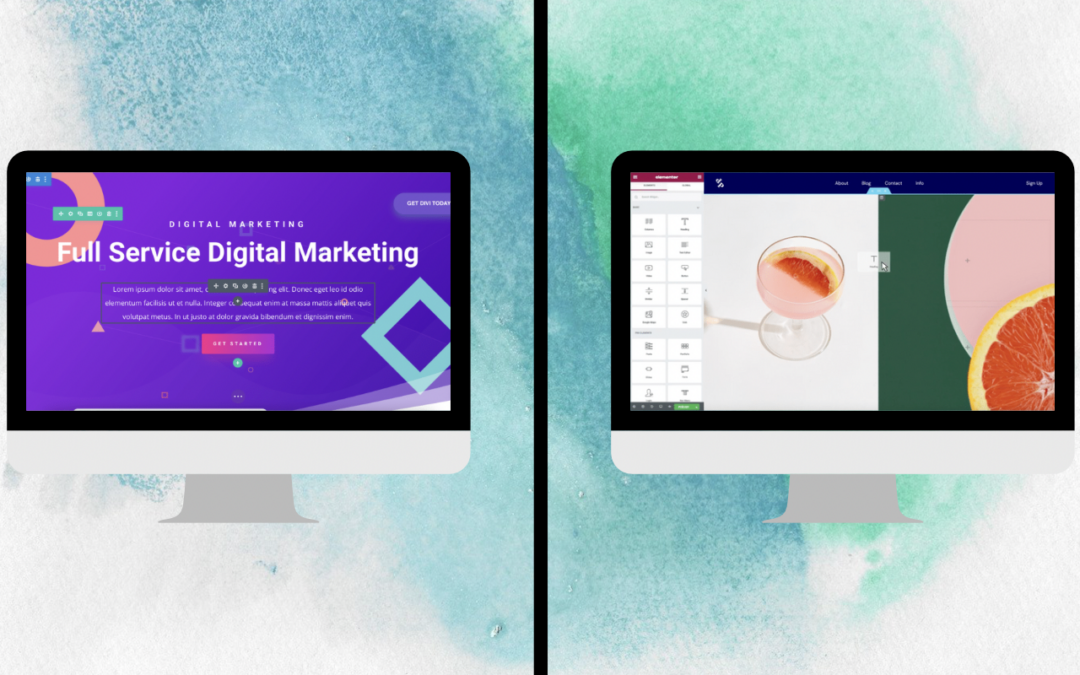As a website development agency, we’ve worked with nearly all of the common WordPress visual editors: Elementor, Elementor Pro, Divi, Visual Composer, Gutenberg, and Cornerstone. We’ve found that Elementor (standard or Pro) and Divi are two of the most popular, which is why we felt it would be worthwhile to analyze their pros and cons and determine the winner of the Divi vs. Elementor debate.
Elementor Analysis:
Elementor is generally marketed as a beginner friendly page builder, that turns the usually confusing WordPress editor into a drag-and-drop visual editor. Before you can begin adding blocks (text, button, image, etc.) to the page, you must create your layout through the use of rows and columns. For example, if you would like a section of the page with text on the left and an image on the right, you would create a one row section with two columns.
After creating the initial layout, Elementor allows you to choose from over 90 blocks, which can be added to the page through the drag and drop editor. Elementor uses a split screen approach, meaning that the “editor” appears as a panel to the left of the page you are editing. We find this approach to be difficult to work with, as the proportions of the website itself do not accurately represent what you will see on the published site. The editor panel itself has a variety of features/options, though they are spread across a few “sub-panels”, which can make it difficult to navigate.

While Elementor does offer a generous amount of blocks, it does not offer many pre-built page templates, meaning that many pages will require starting from scratch. Because Elementor is a page builder and not a theme, it can take a bit of technical knowledge and troubleshooting to integrate a standard menu or navigation bar with the Elementor page.
The largest shortcoming we have found with Elementor is that pages are not often responsive, meaning that they look far different on desktop than mobile. As a result, when we work with Elementor, we generally build a separate mobile version of the website. This is very tedious, significantly prolonging the development process. In addition, it can slow the loading speed of the website. We’ve also found that Elementor blocks do not translate to cleanly written code, which also contributes to slower loading times.
Divi Analysis:
For most projects, Divi is our page builder of choice. In addition to being a page builder plugin, it is also a theme, meaning that the website is perfectly integrated from your pages to your posts to your navigation bar to your footer. Unlike Elementor’s split screen approach, Divi allows the user to perform edits directly on the page, so you can see exactly what the published site would look like while you are making edits. This is a huge time saver, and one of our favorite features about Divi.

We’ve also found that Divi pages load extremely fast. In fact, we’ve seen clients cut their website loading time by 50-70% or more just by switching from Elementor to Divi. The Divi editor itself also loads much faster, with changing taking effect nearly instantly versus Elementor’s 2-3 second lag. While it may seem like a minor inconvenience, it saves a significant amount of time for pages in which we may experience the lag several hundred times.
Divi also comes with a much larger library of themes (called layout packs), which can easily be customized to fit a client’s business. They also have the option of building a new page from an existing page, which is a feature lacked by Elementor.
On the con side, the Divi editor tends to focus more on the visual/design aspects, as opposed to technical ones, so it takes a bit of extra work in cases where we must integrate custom code. Divi is more expensive than Elementor (since Elementor offers a free option and Divi doesn’t). However, our agency owns a lifetime license that can be used on all of our clients’ websites, saving our clients a significant amount of money.
Overall:
Having logged many hours in both systems, we’ve generally found Divi to be the best fit for more clients; however, we always carefully consider the needs of our clients before determining which page builder is best for a specific project. If you’re interested in learning more about our services and how we can help you, please feel free to book a call with one of our team members below!

Recent Comments